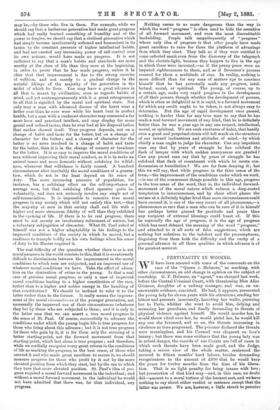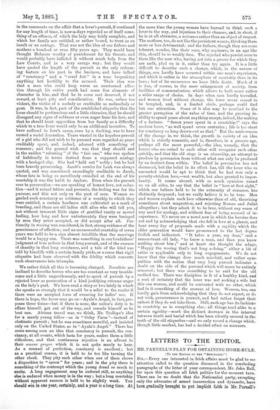, PERTINACITY IN WOOING.
WE have been amused with some of the comments on the case of the "Queen v. Helmore," as marking, with other circumstances, an odd change in opinion on the subject of courtship. G. F. Helmore, an "agent," was charged last week, before the Central Criminal Court, with threatening Miss Alice Grierson, daughter of a railway manager, and was, on unanswerable evidence, convicted. He had, it appears, persecuted the young lady for eleven years with his attentions, sending her letters and presents incessantly, haunting her walks, pursuing her to Paris, whither she went to avoid him, defying and menacing her guardians, and finally descending to threats of physical violence against herself. He would murder her, he would throw vitrol over her, he would pistol her, he would kill any one she favoured, and so on, the threats increasing in virulence as time progressed. The prisoner declared the threats were meaningless, and his Counsel was eloquent on love's lunacy ; but there was some evidence that the young lady was in actual danger, the records of our Courts are fall of cases in which such threats have been made good, and the Judge, taking a severe view of the whole matter, sentenced the accused to fifteen months' hard labour, besides demanding recognisances to the amount of £900 that he would keep the peace for twelve months from the time of his liberation. That is no light penalty for being insane with love ; but persecution of that kind may—and, in this case, no doubt did—amount to a moral torture of the keenest sort, and we have nothing to say about either verdict or sentence except that the latter was severe. We are, huwever, a little struck to perceive in the comments on the affair that a lover's pursuit, if continued for any length of time, is now-a-days regarded as of itself something of an offence, of which the lady may fairly complain, and which her family are entitled, or rather bound, to treat as an insult or an outrage. That was not the idea of our fathers and mothers a hundred or even fifty years ago. They would have thought Helmore worthy of punishment for his threats, and would probably have inflicted it without much help from the Law Courts, and in a very savage way ; but they would have quoted the length of the pursuit as the only redeeming feature on his part in the business, and have talked of " constancy " and a "cruel fair" in a tone bespeaking anything but hostility to the accused. Their idea was that a man who could keep warm an unreturned affection through his entire youth had some fine elements of character in him, and that he in some sort deserved, if not reward, at least pity and consideration. He was, unless too violent, the victim of a malady as creditable as melancholy or gout. It was, in fact, part of the established etiquette that the lover should be pertinacious and a little obtrusive, that he should disregard any signs of coldness or even anger from his love, and that he should treat opposition from her family as a difficulty which to a true lover would only be an additional incentive. To have suffered in love's cause, even by a ducking, was to have earned a social decoration. Years wasted in the hopeless pursuit of a girl who did not wish to be pursued were regarded as years creditably spent, and, indeed, adorned with something of romance ; and the general wish was that they should end in the sudden " relenting " of the "fair one," who was spoken of habitually in terms derived from a supposed analogy with a besieged city. She had "held out" nobly ; but he had been bravely persevering. Jacob's service for Leah was always quoted, and was considered• exceedingly creditable to Jacob, whose fate in being so mercilessly swindled at the end of his courtship it was the habit to deplore. Even when the pursuit rose to persecution—we are speaking of honest love, not seduction—and it rained letters and presents, the feeling was for the pursuer, and this not only on the part of men. Women regarded such constancy as evidence of a worship to which they were entitled, a certain hardness was cultivated as a mark of breeding, and there are old ladies still alive who will tell you, not without innocent little signs of gratified vanity or moved feeling, bow long and bow unfortunately they were besieged by men they never accepted, or did accept after all. Pertinacity in wooing was considered, in fact, strong evidence of the genuineness of affection; and an unsuccessful courtship of seven years was held to be a sign almost infallible that the marriage would be a happy one. There was something in our forefathers' judgment of time ardour in that long pursuit, and of the essence of chastity in that long resistance, and a tale of the kind was told by kinsfolk with a certain family pride, or a sense that rigid etiquette had been observed with the fidelity which converts such observances into triumphs.
We rather think all this is becoming changed. Novelists are inclined to describe heroes who are too constant as very troublesome and a little ungentlemanly, and to speak of pursuit by a rejected lover as persecution of a kind justifying extreme anger on the lady's part. We have read a story or two lately in which she speaks so strongly that it would be a relief to the reader if there were an accepted form of swearing for ladies' use. If there is hope, the lover may go on—Ayala's Angel, in fact, proposes three times—but if there is none, the suitor's duty is to efface himself, get out of the way, and console himself as he best can. African travel was, we think, Mr. Trollope's idea for a manly young fellow—as in "Orley Farm"—instead of obstinate pursuit ; but he was sometimes merciful, and insisted only on the United States, as in " Ayala's Angel." There has come among men an idea that constancy in pursuit, the con
• stancy, at all events, which lasts for years, makes them a little ridiculous, and that continuous rejection is an affront to their amour propre which it is not quite manly to bear. As a counsel of perfection, constancy is excellent ; but as a practical course, it is held to be too like turning the other cheek. They pity each other when one of them shows a disposition to " spoon " for years ; and in the pity there is something of the contempt which the young dread so much to excite. A long engagement may be endured still, as anything else is endured when money is in the way ; but a long courtship without apparent success is held to be slightly weak. You should win in one year, certainly, and a year is a long time. At the same time the young women have learned to think such a lover in the way, and injurious to their chances, and, in short, if he is at all obtrusive, a nuisance rather than an object of respect. The mothers, too, do not like the persistent wooers, thinking them more or less detrimental ; and the fathers, though they are more tolerant, wonder, like their sons, why aspirants, in an age like this, should be so weakly firm. The rejected who persist seem to them like the men who, having got into a groove for which they are unfit, plod on in it, rather than try again. It is a little difficult to describe such a change, which, in the nature of things, can hardly have occurred within one man's experience, and which is rather in the atmosphere of courtship than in its laws ; but of its occurrence we have little doubt. Much of it is due, of course, to the mere enlargement of society, from facilities of communication, which allows to both sexes rather a wider range of choice. In days when men hardly travelled, and women lived without change, the lover never ceased to be tempted, and, in a limited circle, perhaps could find but one attraction. Some of it also may be ascribed to the greater perception of the value of time, and the growing inability to spend years about anything except, indeed, the making of a fortune. "Seven years spent in a courtship !" says the modern lover, "as well spend seven centuries ; life is too short for constancy so long drawn-out as that." But the main reason of the change is, we think, the growth in society of an idea which is strictly romantic, and is, therefore, in a prosaic age, perhaps all the more powerful,—the idea, namely, that the lovers who are suited to each other will recognise each other quickly, and that the old siege is an absurdity, an attempt to produce by persuasion from without what can only be produced by an instinct from within. The belief in persuasion has not decreased, but the belief in its effect has, till the lover who so succeeded would be apt to think that he had won only a poverty-stricken love,—not wealth, but alms granted to importunity. It seems absurd, with so much cynicism round us on all sides, to say that the belief in "love at first sight," which our fathers held to be the extremity of romance, has distinctly deepened ; but we really believe it to be true. Men and women explain such love otherwise than of old, theorising sometimes about magnetism, and rejecting Romeo and Juliet altogether; but they admit it to be true, without any sense of any need for apology, and without fear of being accused of inexperience. We never see a novel now in which the heroine does not end by acknowledging that she fell in love at a glance, and hear every day of proposals made with a rapidity which the older generation would have pronounced to the last degree foolish and indiscreet. "It takes a year, my dear," said a remonstrant old lady, "to know a man, and then you know nothing about him ;" and at heart she thought the adage, "Happy the wooing that's not long a-doing," either a bit of satire or applicable only to long engagements. We do not know that the change does much mischief, and rather sympathise with the notion that very long pursuit indicates a doubt on the side of the pursued which will never be entirely removed ; but there was something to be said for the old method too. There was discipline in it of a healthy kind, and a sort of certainty that the lover was not seeking a wife but this one woman, and could be contented with no other, which had in it something of the essence of love. Women, too, can hardly gain from acknowledging that they do not expect, or do not wish, perseverance in pursuit, and had rather forget their suitors if they do not take them. Still, each age has its fashions in courtship as in everything else; all things tend alike to a certain rapidity—mark the distinct decrease in the interval between death and burial which has been silently secured in the teeth of the old etiquettes—and we only record a change which, though little marked, has had a decided effect on manners.



































 Previous page
Previous page